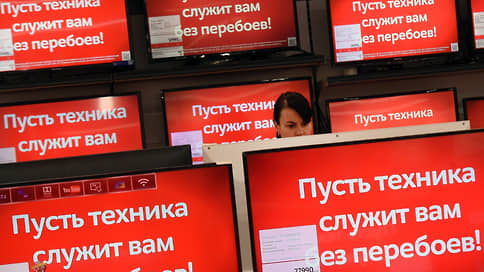Retailers are playing in the box – Newspaper Kommersant No. 46 (7491) of 03/20/2023
[ad_1]

Since the beginning of 2023, TV sales in Russia grew by 6.6%, to 1.55 million, but in money terms they fell by 30%, to 39.1 billion rubles, electronics suppliers calculated. Market participants attribute the situation to a reduction in demand for premium models of South Korean brands due to higher prices. At the same time, sales growth is demonstrated by Chinese and domestic manufacturers, as well as retailers’ own trademarks (PL). The latter have already occupied 22.6% of the market in units and, according to experts, may increase their share to 50% by the end of the year.
Kommersant got acquainted with Holodilnik.ru’s data on TV sales in Russia in January: in real terms, they increased by 21.7% year-on-year, to 785,000 devices. At the same time, in money terms, sales decreased by 11.1%, to 19.9 billion rubles. According to F+ tech-Marvel, in the first 2.5 months of 2023, 1.55 million TVs were sold in Russia, up 6.6% year-on-year. In money terms, over the same period, the market decreased by 30%, to 39.1 billion rubles, and the average price of a device decreased by 35%, to 25,000 rubles.
The fall in the market in monetary terms is associated with a decrease in sales of the premium segment of devices such as LG and Samsung, Alexey Pogudalov, commercial director of Holodilnik.ru, believes. According to him, due to the lack of direct supplies of devices from these brands, their average price has increased by almost 20%. Sales of LG, according to a top manager, fell in January in pieces by 74%, Samsung – by 68%, and Sony – by 81%. Against this background, sales of Xiaomi, Starwind, TCL and the Belarusian Vityaz are growing, Mr. Pogudalov adds.
In the first ten weeks of 2023, 22.6% of TV sales in pieces fell on retailers’ own brands (PTM), Artur Makhlayuk, business analyst at F + tech-Marvel, clarifies, Xiaomi occupied 9.6% of the market, Haier – 8.4 %, Hisense – 6.5%, Samsung – 5.6%. Last year, the leaders were Samsung (23.4%), LG (20.8%), CTM (13.2%), Haier (5.4%) and Xiaomi (5.1%). “Thus, the share of own brands almost doubled over the year, and now almost every fourth TV set sold in Russia is private label,” says Mr. Makhlayuk.
In 2022, a total of 6.8 million TVs were sold on the Russian market, which is 4% less than the result of 2021 in terms of money and 2% less in real terms, says Yegor Panin, head of the Citilink TV and audio procurement group. The most popular TVs in Citylink in 2022 were Hyundai, Sunwind, Xiaomi, and in 2021 LG, Samsung and Hyundai were in the top three. According to Oleg Fomenko, Director of Merlion Broadband Access Purchasing Department, the TV market in 2022 decreased by 5% in units and by 9% in money terms. According to MTS, 80% of buyers in 2022 chose TVs with built-in Smart TV (in 2021, the figure was at the level of 73%): for the year fell by 32% and 36%, respectively.
The change in the “brand landscape” can be compared to the situation in 2006-2008, when Korean companies replaced European and Japanese ones, Alexey Nikonov, head of the Cinema and Sound Department at M.Video-Eldorado, believes. According to him, in 2023, many Russians began to buy TVs with a diagonal of up to 32 inches at a price of up to 20 thousand rubles.
Russian private labels in the TV segment by the end of 2023 may take half of the market in physical terms, says Alexander Surkov, head of the GS Group analytical center: “LG and Samsung will not lose their positions in the premium segment, they are hard to compete with.” According to Mr. Surkov, the decrease in the average check is explained by the fact that the share of cheaper models with low diagonals is higher in private labels, in addition, such devices do not have an extra charge for a popular brand. The expert emphasizes that, as a rule, private labels “are less technologically advanced in production, so the number of defects from such manufacturers may not be too significant, but more than that of other companies.”
[ad_2]
Source link





